Celebrating the Chinese New Year with couplets is no longer a tradition only among the Chinese. In this issue of My UM, several UM faculty members and students share their thoughts on the Chinese New Year and the traditional Chinese style of celebration. Moreover, they each wrote a celebratory message for the New Year.
Lucky Star Shining on Exam Days
Hannah Keely Sin from South Africa is a first-year student in the Department of English. Half Chinese and half African, Sin moved to Foshan, Guangdong province, at age seven. She confesses that although she started learning Chinese at a very young age, she only has limited knowledge of Classical Chinese. Her grandmother observes traditional customs and celebrates every Lunar New Year in the traditional way.
‘Before each Lunar New Year, my grandma would put up couplets in different places around the house. I never fully understand the meanings of those couplets, but I guess they express wishes for good things like fortune and health.’ One couplet that left a particularly deep impression on her read ‘Lucky Star Shining Above’. She found it amusing, ‘If you look up and see the stars, it will bring you good luck?’ But she has learned that ‘When in China, do as the Chinese do’, which means writing couplets for the Chinese New Year. ‘Not only will this bring a festive feel to my dormitory, it might also bring me good luck in the final exams. But of course I will work hard, instead of cramming at the last minute,’ she says.
Learning to Write Chinese
Rui da Silva from Portugal is a lecturer in the Department of Portuguese. He wrote a couplet that read, ‘Diligence is the way to scale the high mountain of books; hard work is the boat that crosses the boundless ocean of learning.’ He treats this maxim as his motto and uses it to motivate his students to work hard and chase their dreams. ‘Whenever I encounter a difficulty, I remind myself of this couplet,’ he says. Silva developed a strong interest in Chinese culture in middle school, majored in Chinese in college, and taught Chinese at an overseas Confucius Institute and a university. Some foreigners think Chinese is a difficult language to learn because the strokes are not easy to memorise, and Silva agrees. He says, ‘It takes a lot of time and energy to learn to write Chinese characters. Repetition is the only way to memorise the strokes. Sometimes a little imagination helps. Interesting stories can also aid memory. Writing Chinese words allows you to understand the spirit of Chinese culture.’
‘Fu’ Upside Down
Half Portuguese and half American, Benjamim Roth Soares is a fourth year student in the Department of Communication. Born in Macao, he divided his time growing up between Zhuhai and Macao. Although Chinese is not his mother tongue, he started learning Cantonese under the influence of his peers. He loves Chinese culture and enjoys the festive atmosphere of the Chinese New Year. When he first saw people pasting the Chinese character ‘Fu’ (which means luck or fortune) upside down on their doors, he thought it was a mistake. Later he learned that it was intentional, because the Chinese word ‘upside down’ sounds the same as ‘arrive’. So pasting the character ‘Fu’ upside down means luck or fortune will arrive. For Soares, the Lunar New Year, like Christmas, is a very important festival. ‘The entire country is celebrating, and everybody returns home to be reunited with their family,’ he says. Planning to graduate this year , he wishes for good fortune, and hopes to continue to enjoy music and play his guitar after starting work.
An Interesting Phenomenon
Hans-Georg Moeller from Germany is a professor in the Philosophy and Religious Studies Programme. He has noticed an interesting phenomenon: the atmosphere of the Lunar New Year or Christmas is defined by the decorative lights on the streets and the activity in shopping malls. ‘Before every Lunar New Year or Christmas, everybody gets anxious to book air tickets so they can travel abroad with their friends and spend a long holiday . But what about the original meaning of these festivals? Nowadays, aided and abetted by the media, holidays are becoming increasingly commercialised.’ Prof Moeller recalls the old days when the Lunar New Year and Christmas were joyous times when family members reunite and renew their attachments. As to couplets for the upcoming Chinese New Year, he is inclined to write Lao Tzu’s ‘The movement of the Tao by contraries proceeds’, which admonished people to just let it be.
Zhu Shoutong, associate director of the Centre for Chinese History and Culture, professor in the Department of Chinese Language and Literature, and executive vice president of an association of Chinese calligraphers from Hong Kong, Macao, Taiwan, mainland China, and overseas, is well-versed in the couplet culture. He is also in the habit of writing couplets for the Lunar New Year, because it adds to a festive atmosphere and creates an intellectual ambiance around the house. During our interview, Prof Zhu wrote a couplet to wish My UM readers all the best in the New Year.
The Origin of Couplets
Prof Zhu explains that the predecessor of spring couplets were peach wood charms, which were believed to have the power to keep away evil spirits and ghosts. According to ‘Treatise on Rites’ in The Book of the Later Han, peach wood charms were made of peach wood. They are six inches long and three inches wide, inscribed with the names of two gods Shen Cha and Yu Lei, to keep away evil spirits and ghosts. Prof Zhu says, ‘Chinese people have always held words in awe. Legend has it that Cang Jie, the god believed to have created the words we are using now, heard ghosts weeping at night after he created words during the day. You can tell from the legend that words were held in the highest esteem. “Showing respect to paper with words on it” has always been part of the Chinese folk culture, for the same reason: being in awe of words. People in ancient China wrote and pasted words on their doors as a way to keep away evil spirits and ghosts, because they had utter confidence in the magical power of words.’
Source: My UM


Hannah Keely Sin thinks that couplets can adds to a festive feel

Da Silva has been learning Chinese characters for many years
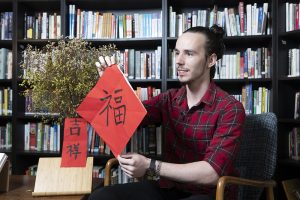
Soares pasts the character ‘Fu’ upside down for luck and fortune
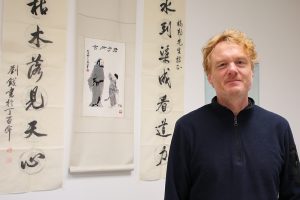
Prof Moeller
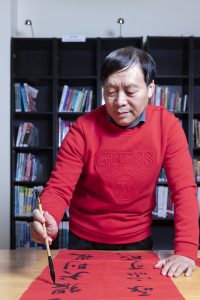
Prof Zhu Shoutong
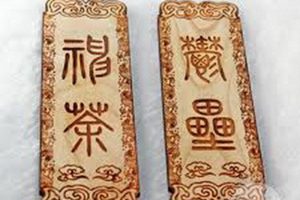
Peach wood charms is the earliest form of couplets (source: internet stock images)
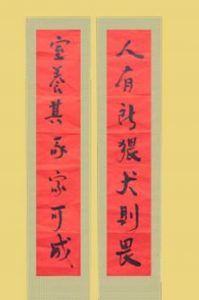
Prof Zhu writes a couplet to wish My UM readers all the best in the New Year
